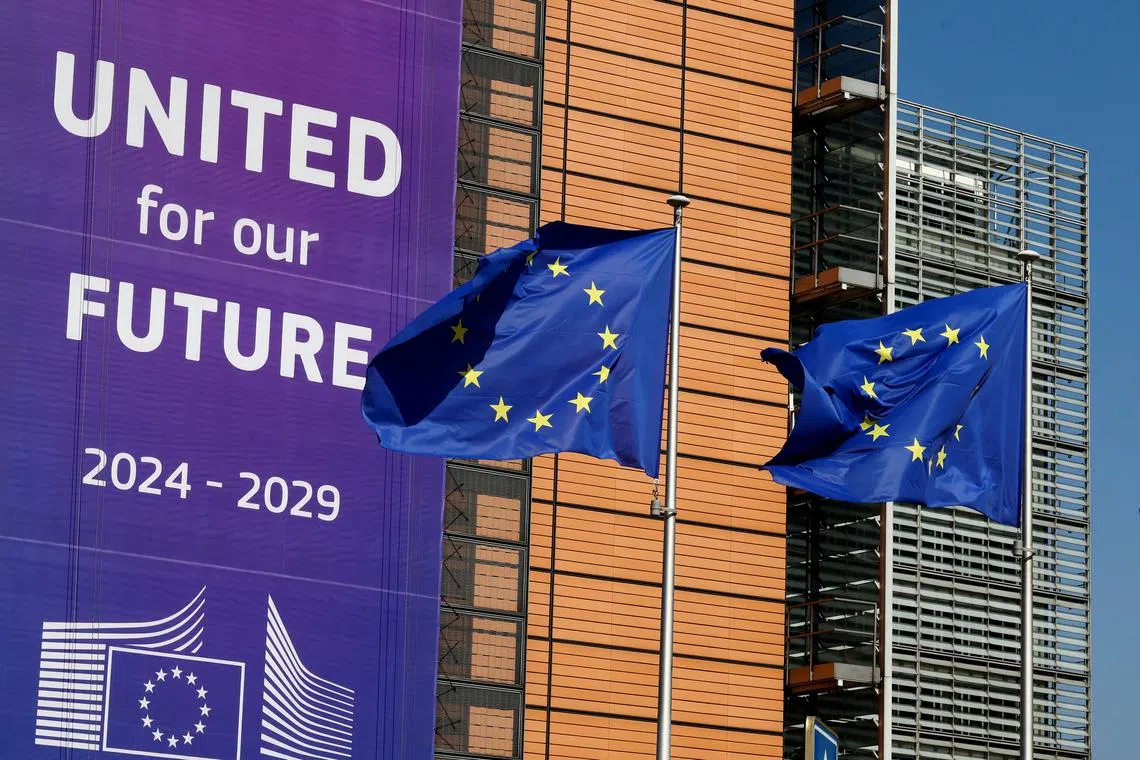EU pauses countermeasures following Trump’s tariff reprieve
Sign up now: Get ST's newsletters delivered to your inbox

EU is still assessing how to respond to US car tariffs and the broader 10 per cent levies still in place..
PHOTO: REUTERS
The European Union will pause its first countermeasures against US tariffs after President Donald Trump temporarily lowered the hefty duties he had just imposed on dozens of countries, European Commission chief Ursula von der Leyen said on April 10.
The bloc was due to launch counter-tariffs on about €21 billion (S$31 billion) of US imports from April 15 in response to Mr Trump’s 25 per cent tariffs on steel and aluminium. It is still assessing how to respond to US car tariffs and the broader 10 per cent levies still in place.
“We want to give negotiations a chance,” Dr von der Leyen said on X. “While finalising the adoption of the EU countermeasures that saw strong support from our member states, we will put them on hold for 90 days.”
Mr Trump’s sudden decision on April 9 to pause most of his hefty new duties
His turnabout, which came less than 24 hours after steep new tariffs kicked in, followed the most intense episode of financial market volatility since the early days of the Covid-19 pandemic.
US stock indexes shot higher on the news, and the relief continued into Asian and European trading on April 10.
Before Mr Trump’s U-turn, the upheaval had erased trillions of dollars from stock markets and led to an unsettling surge in US government bond yields that appeared to catch the US president’s attention.
Mr Trump kept the pressure on China, the world’s No. 2 economy and second-biggest provider of US imports with an increase of tariffs on Chinese imports to 125 per cent from the 104 per cent level that kicked in on April 9.
He also signed an executive order aimed at reducing China’s grip on the global shipping industry and at reviving US shipbuilding.
Trade war with China
China rejected what it called threats and blackmail from Washington.
China will “follow through to the end” if the US insists on its own way, Commerce Ministry spokesperson He Yongqian told a regular press briefing. China’s door was open to dialogue, but this must be based on mutual respect, the ministry said.
Beijing may again respond in kind after imposing 84 per cent tariffs on US imports on April 9 to match Mr Trump’s earlier tariff salvo.
Mr Trump, who claims the tariffs aim to fix US trade imbalances, said a resolution with China on trade is also possible. But officials have said they will prioritise talks with other countries as Vietnam, Japan, South Korea and others line up to try and strike a bargain.
China’s yuan hit its lowest against the dollar on April 10 since the global financial crisis.
EU pause
Euro zone government bond yields jumped, spreads tightened, and markets scaled back their bets on European Central Bank rate cuts after Mr Trump’s latest announcement. European shares surged.
Mr Trump’s move was an important step towards stabilising the global economy, Dr von der Leyen said, before announcing a pause in the EU’s own counter-tariffs.
But she warned they could be brought back in.
“If negotiations are not satisfactory, our countermeasures will kick in. Preparatory work on further countermeasures continues.” She added: “As I have said before, all options remain on the table.”
Mr Trump’s reversal on tariffs is not absolute. A 10 per cent blanket duty on almost all US imports will remain in effect, the White House said. The announcement also does not appear to affect duties on autos, steel and aluminium that are already in place.
The US tariff pause also does not apply to duties paid by Canada and Mexico, because their goods are still subject to 25 per cent fentanyl-related tariffs if they do not comply with the US-Mexico-Canada trade agreement’s rules of origin.
The EU had been due to impose extra tariffs on US imports including maize, wheat, motorcycles, poultry, fruit and clothing. Those are now suspended. Elsewhere, India was among countries that said it wants to move quickly on a trade deal with the United States.
Uncertainty and concerns
Meanwhile, oil prices retreated 2 per cent on April 10 as fears of a deepening US-China trade war and a possible recession eclipsed earlier relief created by Mr Trump’s announcement of a pause.
Some central bankers also remained cautious.
European Central Bank policymaker Francois Villeroy de Galhau, speaking of the pause in the tariff hike, told France Inter Radio that it was “less bad news” than before, but uncertainty remained and that was a threat to trust and growth.
And business leaders warned that not all was resolved.
The head of the French wine and spirits lobby group FEVS said Mr Trump’s decision to hit pause was “half good news”.
Mr Nicolas Ozanam said the move will initially allow French wine and spirits companies to resume shipments with lower tariffs, and therefore at the same level as other suppliers.
But the 90-day window created logistical constraints, and given that 10 per cent custom duties remained in place, the sector still faced inflationary pressures.
“This will still lead to a rise in prices and therefore a drop in consumption in the United States,” he told Reuters. REUTERS


